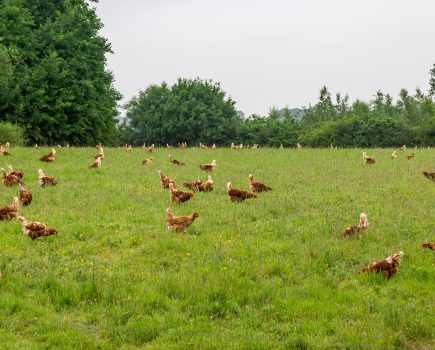Keeping chickens is often the first step on the road to ‘the good life’
Keeping chickens is often the first step on the road to ‘the good life’
Keeping chickens is an important decision, and there is a wide variety of breeds to choose from, so think why you want them, and find out about the different possibilities. Do you want eggs? Birds for the table? Or ornamental chickens to brighten up your garden? As far as feeding, caring for them or housing is concerned, it doesn’t matter which breed you choose, unless it’s one, such as Brahmas or Cochins, that has special requirements. Every breed has its advantages and disadvantages, its specific characteristics and behaviour. Some produce large eggs, some only small eggs. Some stay in production during the winter, others are frequently broody and others never sit. They can differ totally in appearance, and colour varieties are nearly endless. As well as pure breeds, there are hybrids and cross breeds. Some breeds or varieties are in danger of extinction, so you might think about breeding these to protect them.
Finding your chickens The easiest way is to contact a poultry club – see our BREEDER’S DIRECTORY for a list of breeders. In general, exhibition breeds are a more expensive than ordinary layers. On the other hand, they’re mostly more attractive, and if you sell on hatching eggs, baby chicks or grown stock, they pay you back again. Exhibition breeds, in general, lay fewer eggs than layers, but most enough for an average family. But if you want lots of eggs, it’s better to purchase real layers, young healthy chickens and a breed that you like. A good age to purchase them is 16 weeks or so.
Housing Good housing is the key to successfull poultry keeping. It is the basis for good health and producing good eggs. A good house with a run will cost in the region of £400 but should last well – in general, 10 years or so. There are different kinds of houses available, so it’s a good idea to investigate the options from different manufacturers. On the other hand, some poultry keepers build their own house and there are plans available to help you. It’s important that your hen house is well sited – a little above ground level and in a dry place, somewhere that gets daily sunlight and shade. Chickens can withstand cold temperatures but not serious damp, draught and full sunshine for a long period.
Tips for your poultry house As you have to go twice a day, every day, to the hen house to feed and collect eggs, it’s wise to make a good path to, and around, the poultry house so that you can reach it easily in winter and on rainy days. To avoid flooding, place the poultry house a little higher than ground level. Do not place the front in full wind, sun or rain. Place drinking fountains, food, grit and nest boxes in the poultry house in such a way that they’re not easily polluted. Clean nest boxes equal clean eggs. Woodchips, buckwheat and oat husks are excellent on the floor or in the nest boxes, and very hygienic materials. Important points Size: don’t overcrowd the house. Utility breeds need about 0.4 square metres per hen. About half that will do for bantams, depending on the breed, size and character. Runs: a good sized run is strongly recommended for all types of poultry as it will suit their natural behaviour. A tray of sand will allow the chicken to have a dust bath. Sleeping quarters: should have good ventilation without being draughty, and perches are important for roosting at night. They should all be situated at the same height to prevent the chicken arguing about sitting on a higher level than the others. Nest boxes: should be attached to or placed within the sleeping quarter, big enough for the size of the breed, and deep enough, so that freshly laid eggs won’t fall out. The nest box must be easily reached so that eggs can be collected easily. The bedding of the nest box mostly consists of a good layer of shavings, some straw or hay. To find out more For advice on the poultry that is best for you, see the COUNTRY SMALLHOLDING BREEDER’S DIRECTORY To contact other poultry keepers visit our FORUMS







